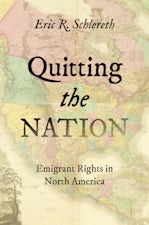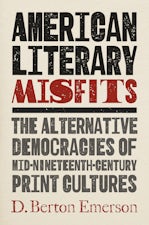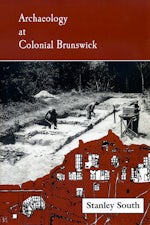The American Union and the Problem of Neighborhood
The United States and the Collapse of the Spanish Empire, 1783-1829
By James E. Lewis Jr.
320 pp., 6.125 x 9.25, notes, bibl., index
-
Paperback ISBN: 978-0-8078-4736-7
Published: September 1998 -
E-book EPUB ISBN: 978-0-8078-6689-4
Published: November 2000 -
E-book PDF ISBN: 979-8-8908-6989-0
Published: November 2000
Buy this Book
- Paperback $42.50
- E-Book $29.99
For Professors:
Free E-Exam Copies
Awards & distinctions
A 1999 Choice Outstanding Academic Title
ideas about and concern for the union of the states in the
policymaking of the early republic. For four decades after the
nation's founding in the 1780s, he says, this focus on securing a
union operated to blur the line between foreign policies and
domestic concerns. Such leading policymakers as Thomas Jefferson, James Madison, James Monroe, John Quincy Adams, and Henry Clay worried about the challenges to the goals of the Revolution that would arise from a hostile neighborhood--whether composed of new nations outside the union or the existing states following a division of the union.
At the center of Lewis's story is the American response to
the dissolution of Spain's empire in the New World, from the
transfer of Louisiana to France in 1800 to the independence of
Spain's mainland colonies in the 1820s. The breakup of the
Spanish empire, he argues, presented a series of crises for the
unionist logic of American policymakers, leading them, finally,
to abandon a crucial element of the distinctly American approach
to international relations embodied in their own federal union.
About the Author
James E. Lewis Jr. is assistant professor of history at Louisiana State University in Baton Rouge.
For more information about James E. Lewis Jr., visit
the
Author
Page.
Reviews
"The author has explored an aspect of early American foreign policy not before raised. The research is broad and deep, rich in its coverage of secondary material, as one would expect of a book derived from a dissertation. The bibliography will assist specialists and students at all levels, and the book belongs in major libraries that focus on early American history and the history of American foreign affairs."--American Historical Review
"Well reasoned, well researched, and beautifully crafted. . . . His work is both thoughtful and provocative, and serious scholars of the early republic--and general American historians--will find it well worth reading."--Journal of American History
"In this ambitious book James Lewis attempts to refocus our understanding of an important transitional period in American history. By exploring the problem of American union in relation to events occurring in other parts of the hemisphere, he offers a fresh look at two generations of unionist policymakers in the newly independent United States."--Drew R. McCoy, Clark University
"Lewis has written a new style of 'headquarters history' that social and cultural historians will want to read. Like it or not, persons in office in the new United States made policies that affected ordinary people's interests as well as the long-term health of the republic. Wading patiently through the swamps of political rhetoric that accompanied the national political process, Lewis has provided us a reliable map of where and how the opinions and actions of 'policymakers' touched the lives of ordinary people and shaped the stories of self-creation that fascinate the latest generation of cultural historians."--John Lauritz Larson, Purdue University




